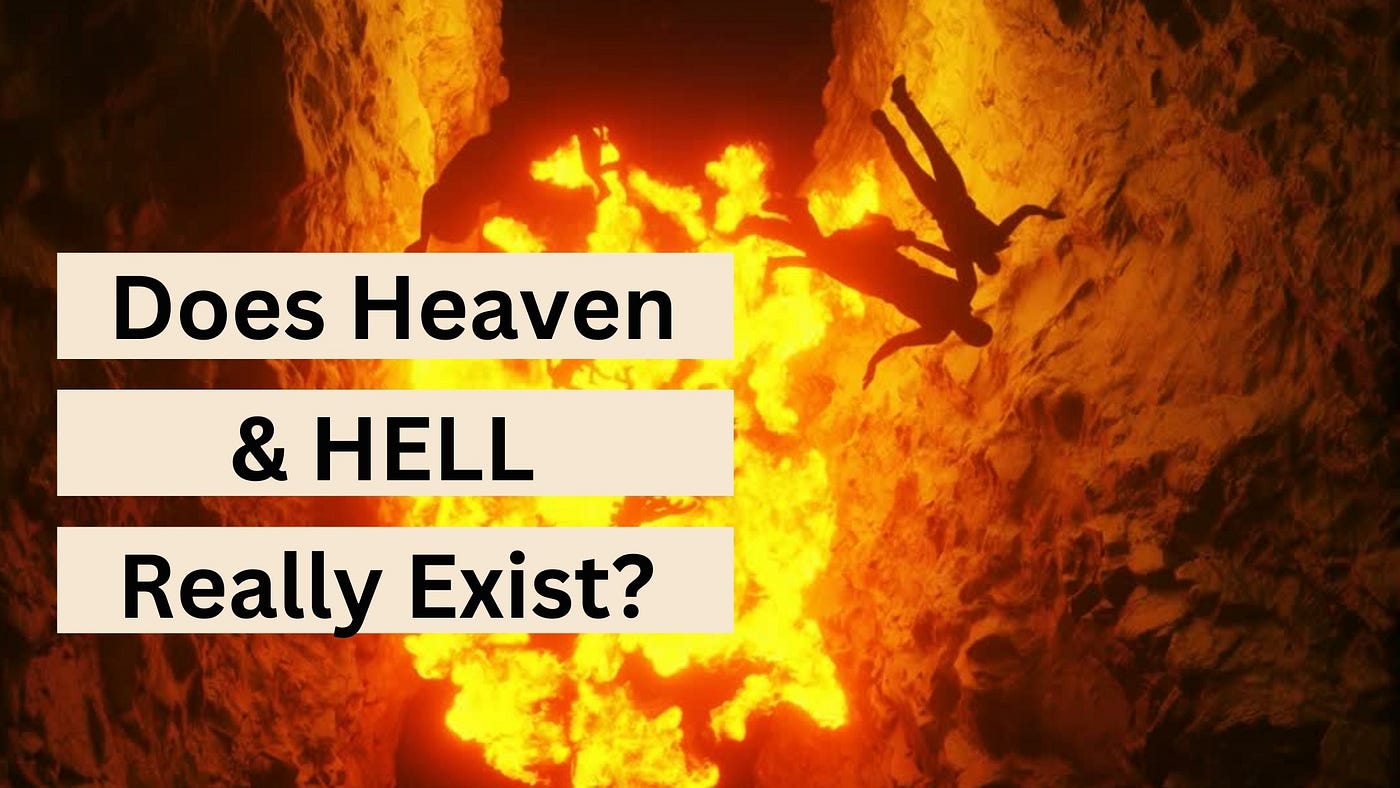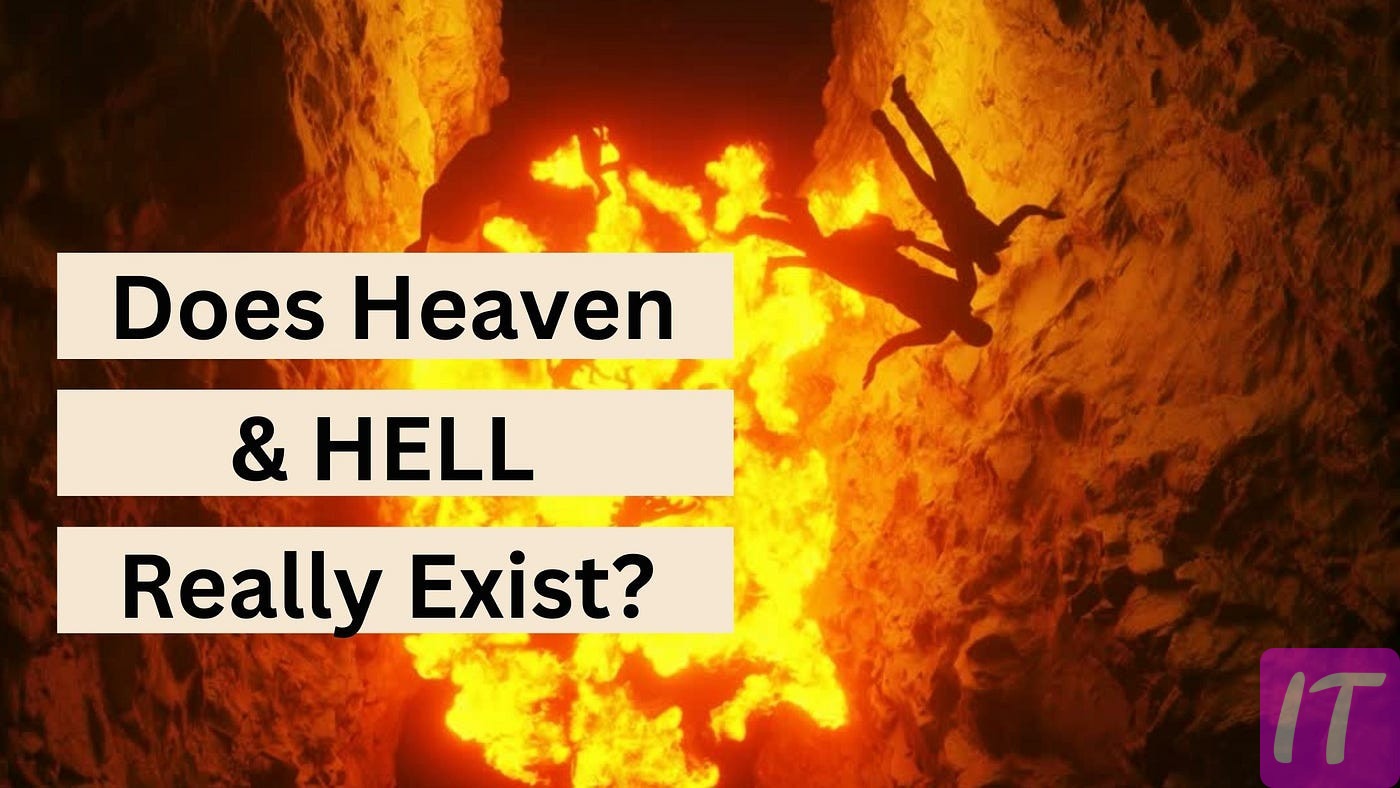Consider for a moment the pervasive influence of heaven and hell in human culture and thought. Stories and beliefs about these realms have spanned millennia, shaping entire civilizations. This prompts a timely question: can we truly affirm their existence, or are they mere constructs of human imagination and morality?
Historically, concepts of heaven and hell have roots intertwined with religious texts and doctrines, from the Abrahamic traditions to Eastern philosophies. A 2017 Pew Research Center study found that 72% of Americans believe in heaven, while 58% believe in hell. These numbers illustrate the profound hold these ideas maintain, suggesting a compelling intersection of faith, psychology, and existential inquiry.
 Source: medium.com
Source: medium.com
Historical Perception of Heaven and Hell
In ancient civilizations, concepts of heaven and hell existed long before modern religions. The Egyptians believed in an afterlife where one’s soul would be judged. Good souls went to the Field of Reeds, a paradise, while bad souls faced eternal punishment. This belief influenced their burial practices, including mummification and tomb building. Such practices show how central these ideas were to their culture.
In Greek mythology, the underworld was ruled by Hades, a place both feared and mysterious. The Elysian Fields represented the final resting place for heroes and the virtuous. Conversely, Tartarus was a dungeon of torment for sinners. These places highlighted the Greeks’ idea of moral consequences after death. The tales from Greek mythology continue to influence modern views of the afterlife.
In Christianity, descriptions of heaven and hell are vivid and detailed. Heaven is depicted as a place of eternal joy in God’s presence. Hell, however, is a place of fire and brimstone reserved for the wicked. These descriptions have been used to guide moral behavior among believers. The Bible’s depictions have become some of the most influential sources on the topic.
Eastern religions also contribute to the perception of heaven and hell. Buddhism speaks of various heavens and hells where souls are reborn based on their karma. Hinduism describes different levels of existence, with both heavenly realms and hellish experiences. These beliefs offer a complex view of the afterlife, emphasizing moral deeds. Together, they shape how vast and diverse historical perspectives on heaven and hell can be.
Role in Ancient Religions
In ancient Mesopotamia, the earliest recorded religion featured a complex afterlife. Souls journeyed to the netherworld, a shadowy place beneath the earth. This underworld was ruled by the goddess Ereshkigal. Citizens performed rituals to ensure a smooth transition for the deceased. These beliefs set the foundation for similar ideas in later cultures.
Ancient Egyptian religion heavily focused on the afterlife, which was central to their culture. The Egyptians believed in an elaborate journey through the afterlife, guided by the “Book of the Dead.” They performed mummification to preserve the body for its next life. Rituals and offerings were essential to secure a place in the afterlife. This complex system emphasized moral behavior and devotion to gods.
In Norse mythology, warriors who died in battle were believed to go to Valhalla. Ruled by Odin, this hall served as an eternal abode for heroic souls. Those who did not die in battle went to Hel, a realm ruled by the goddess Hel, not necessarily a place of punishment. These beliefs encouraged bravery and heroism among Viking warriors. They provided a clear moral code and expectations.
In Zoroastrianism, one of the world’s oldest monotheistic religions, the concepts of heaven and hell are quite detailed. After death, souls cross the Chinvat Bridge. The righteous cross safely to paradise, while the wicked fall into an abyss of torment. Moral actions during one’s life determine the soul’s fate. Such ideas had a profound influence on later Abrahamic religions.
Scientific Perspectives on Heaven and Hell
Scientists often approach the concepts of heaven and hell from a psychological and neurological standpoint. Brain studies suggest that experiences of near-death and intense meditation can create sensations similar to religious descriptions. These experiences might be linked to specific neural activities. This has led many researchers to view heaven and hell as products of the human mind. They argue that such experiences are subjective rather than objective realities.
From an evolutionary perspective, belief in an afterlife may have offered survival advantages. It could improve social order by promoting moral behavior. Communities with strong moral frameworks tend to cooperate better and thrive. This might explain the widespread nature of these beliefs across cultures. Evolutionary biologists study these patterns to understand their origins.
Astrophysicists and cosmologists also weigh in on the debate. They argue that no physical evidence exists for locations like heaven or hell. Modern telescopes have explored vast regions of space without finding such places. This scientific viewpoint challenges traditional religious narratives. It raises questions about where and how these realms exist, if at all.
Despite these scientific perspectives, many people continue to believe in heaven and hell. Surveys show significant percentages maintaining faith in these concepts. This highlights a complex interaction between scientific reasoning and personal belief. Scientists acknowledge that beliefs in heaven and hell play crucial roles in human culture and psychology. They explore these roles without necessarily validating the beliefs themselves.
Societal Impact of Belief in Heaven and Hell
The belief in heaven and hell has significantly influenced societal norms and moral standards. Throughout history, these concepts have been used to encourage good behavior and discourage wrongdoing. By promising eternal reward or punishment, societies maintained order and stability. Such beliefs were effective in guiding people’s actions and shaping cultural norms. They became deeply ingrained in the legal and social systems of many cultures.
Religious institutions have often leveraged these beliefs to exert control and influence. Sermons and religious teachings frequently emphasize the consequences of moral behavior. This has led to the establishment of laws and ethical frameworks based on religious principles. Such institutions play a pivotal role in community cohesion. They enforce a shared sense of right and wrong among their followers.
Educational systems have also incorporated these beliefs into their curricula. In many religious schools, students learn about heaven and hell as part of their moral education. This shapes their understanding of ethics from a young age. It helps to instill a sense of accountability and responsibility. The impact is profound, as it molds the character and values of future generations.
On a broader scale, art and literature have been deeply influenced by these concepts. Numerous works of art, from Dante’s “Divine Comedy” to Michelangelo’s “The Last Judgment,” explore themes of heaven and hell. These creations reflect and reinforce societal beliefs. They provide a visual and narrative representation of these abstract ideas. Such works continue to inspire and provoke thought across the ages.
Belief in heaven and hell also affects how communities deal with death and the afterlife. These beliefs provide comfort and a sense of purpose, especially during difficult times. They offer explanations for suffering and hope for a better existence after death. This makes the concepts of heaven and hell hugely influential in shaping societal attitudes. They help individuals find meaning in life’s challenges and uncertainties.
Finally, these beliefs have implications for mental health and well-being. They can offer solace to those facing grief or existential crises. Knowing that a higher purpose or afterlife exists can provide emotional relief. However, the fear of eternal punishment can also cause anxiety in some individuals. Thus, the societal impact of these beliefs is complex and multifaceted.
Psychological Interpretations of Heaven and Hell
Psychologists often study heaven and hell as manifestations of human psychology. These concepts can influence how people deal with stress, guilt, and hope. Belief in heaven offers comfort, suggesting a positive outcome after life’s hardships. Fear of hell can discourage harmful behavior and promote ethical living. Both serve as powerful motivators in shaping human behavior.
From a cognitive perspective, the idea of an afterlife helps people make sense of life and death. It provides a framework to understand existential questions and reduce anxiety. People often turn to these beliefs in times of crisis or loss. This psychological mechanism can bring peace during uncertain times. It helps individuals navigate complex emotional landscapes.
A table comparing positive and negative psychological impacts:
| Positive Impacts | Negative Impacts |
|---|---|
| Provides comfort and hope | Can cause fear and anxiety |
| Encourages moral behavior | Might lead to guilt or shame |
| Helps cope with loss | Can become obsessive |
Psychotherapists sometimes explore these beliefs during counseling sessions. They examine how concepts of heaven and hell affect a person’s mental health. For some, these beliefs are sources of strength and resilience. For others, the fear of hell can lead to excessive worry or even depression. Therapists work to balance these beliefs to support well-being.
Overall, the psychological interpretation of heaven and hell shows their significant impact on our minds. They guide moral choices, alleviate fears, and provide a sense of purpose. Understanding these psychological dimensions helps us see why these concepts endure. They are integral parts of human experience and resilience. From comfort to anxiety, their influence is vast and varied.
Theological Debates about Heaven and Hell
Theological debates about heaven and hell span centuries and continue to shape religious thought. Scholars and religious leaders often argue about the nature and reality of these realms. Some believe in a literal interpretation, where heaven and hell are physical places. Others view them as metaphorical, representing spiritual states rather than actual locations. These differing viewpoints create a rich dialogue within religious communities.
A major point of contention is who gets to enter heaven or hell. Some theologians argue that salvation is exclusive to believers of their faith. Others propose a more inclusive view, suggesting that good deeds and moral character determine one’s fate. These debates influence religious teachings and the behavior of followers. People often look to their religious texts and leaders for guidance.
A table highlighting different theological perspectives:
| Perspective | Heaven | Hell |
|---|---|---|
| Literal | Physical paradise | Physical place of torment |
| Metaphorical | Spiritual state of bliss | Spiritual state of suffering |
| Inclusive | Open to all good people | Reserved for the truly evil |
The idea of eternal punishment has sparked many debates. Some question the morality of a loving deity condemning souls to eternal torment. They argue for the concept of universal salvation, where everyone eventually achieves redemption. This view is gaining traction among more progressive religious circles. Traditionalists, however, maintain the importance of hell as a deterrent to immoral behavior.
Debates also arise over the descriptions of heaven and hell found in sacred texts. Some argue that these descriptions are symbolic and open to interpretation. Others insist on a more literal reading. This leads to a wide range of beliefs within the same religious traditions. The diversity of thought showcases the complexity and depth of these theological issues.
Overall, theological debates about heaven and hell reveal much about human spirituality. They explore the boundaries of faith, morality, and justice. These discussions help individuals and communities understand their beliefs. Whether literal or metaphorical, the concepts of heaven and hell continue to provoke deep reflection and discussion.
Source: squarespace.com
Frequently Asked Questions
Here are some common questions related to the beliefs, interpretations, and impacts of heaven and hell. These answers aim to clarify these profound topics for a better understanding.
1. What do different religions say about heaven?
Different religions have unique perspectives on heaven. In Christianity, heaven is seen as paradise in God’s presence. Islam describes several levels of heaven, each more glorious than the last. Hinduism talks about Swarga Loka, where gods and virtuous souls reside temporarily before reincarnation.
Buddhism also includes multiple heavens but emphasizes they are not eternal; enlightened beings move beyond them. Despite varied descriptions across religions, the concept of a blissful realm for good souls is a common theme that offers hope and guides moral behavior.
2. How does modern science view the concept of hell?
Modern science generally does not support the idea of a physical hell. Scientific methods require empirical evidence, which is lacking for any literal hellish realm. Psychologists might study the effects of believing in hell on mental health or moral behavior instead.
Additionally, neuroscientists examine how certain brain activities could create experiences people might interpret as “hellish” during trauma or near-death experiences. While recognizing its powerful symbolic impact, science often views hell more as a cultural and psychological phenomenon rather than an objective reality.
3. How has literature portrayed heaven and hell historically?
Heaven and hell have been richly depicted in literature throughout history. Dante’s “Divine Comedy” provides one of the most detailed literary explorations of both realms. Milton’s “Paradise Lost” also offers vivid descriptions that have influenced Western perceptions immensely.
Lesser-known works like John Bunyan’s “The Pilgrim’s Progress” portray these concepts through allegory and adventure tales. Across various cultures and eras, literature uses these themes to address fundamental human concerns about morality, fate, and the afterlife.
4. What are some psychological benefits of believing in heaven?
The belief in heaven can provide significant psychological benefits to individuals. It offers comfort during times of loss by reassuring people their loved ones are in a better place. This helps cope with grief more effectively by providing hope for an afterlife reunion.
Moreover, thinking about heavenly rewards encourages positive behavior aligned with ethical values taught by one’s religion or culture. This moral compass fosters community cohesion while enhancing personal well-being through spiritual fulfillment and purpose-driven life choices.
5. Why do some theologians argue against eternal punishment?
Some theologians challenge the concept of eternal punishment due to perceived inconsistencies with a loving deity’s nature. They question how infinite torment aligns with divine compassion and justice principles advocated by many religions today—fostering debate around alternative interpretations such as universal salvation theories instead.
This viewpoint suggests all souls eventually reconcile themselves back towards God or attain enlightenment without suffering indefinitely—a perspective gaining traction among progressive religious circles seeking less punitive understandings aligned alongside their contemporary ethics frameworks emphasizing mercy over retribution traditions typically associated within older doctrinal views surrounding damnation narratives found across various faiths historically worldwide too often emphasizing fear rather than love-based motivations behind divine judgment systems espoused therein alternately propagated accordingly thereafter likewise forthwith unto eternity itself perhaps ultimately resulting finally once more into peaceful transcendence altogether always forever eternally henceforth truly thenceforward endlessly positively infinitely harmoniously!
Conclusion
In exploring the concepts of heaven and hell, we see a rich tapestry woven from religious, psychological, and cultural threads. Each perspective adds depth to our understanding, whether we approach them as literal places or symbolic constructs. These beliefs influence our morals, our societies, and our personal experiences.
Understanding these concepts requires thoughtful consideration of both historical and modern viewpoints. Whether through theological debates, scientific inquiry, or literary exploration, the discussion about heaven and hell remains ever-relevant. Such discourse continues to shape how we perceive the afterlife and our place within the universe.








